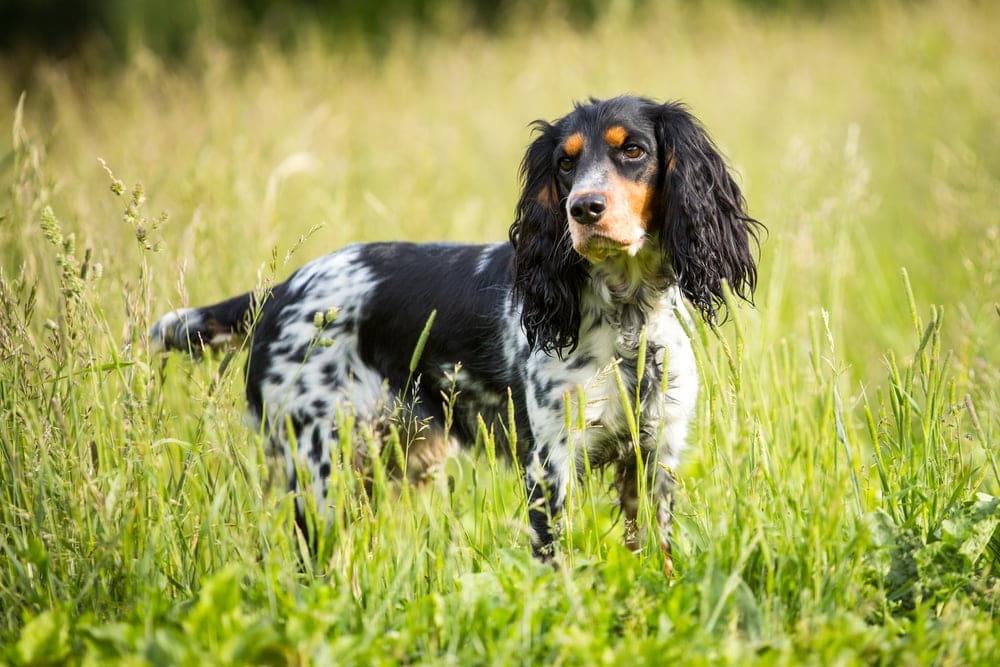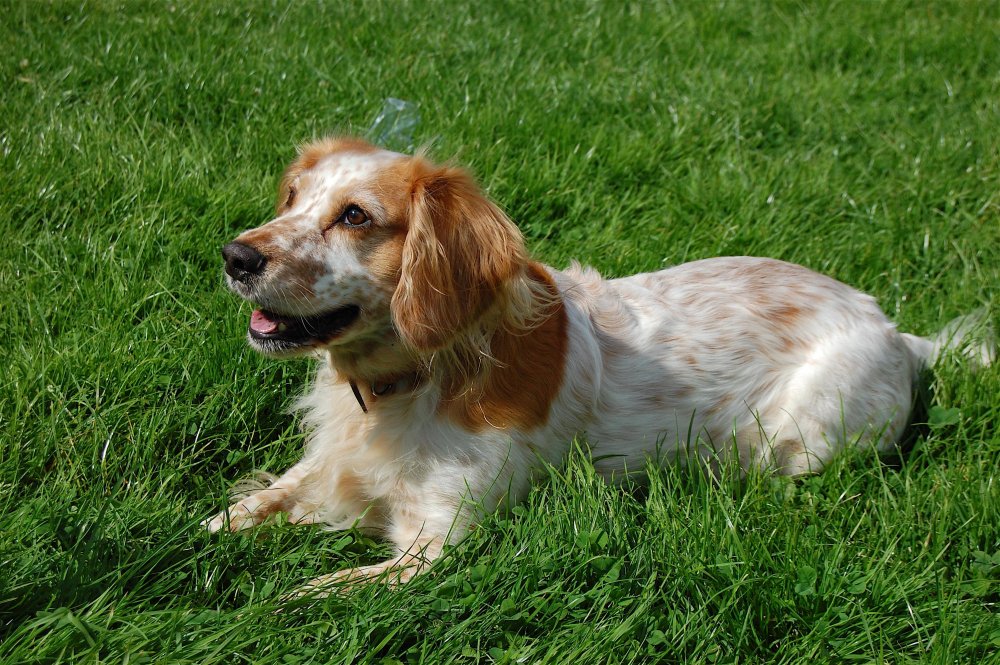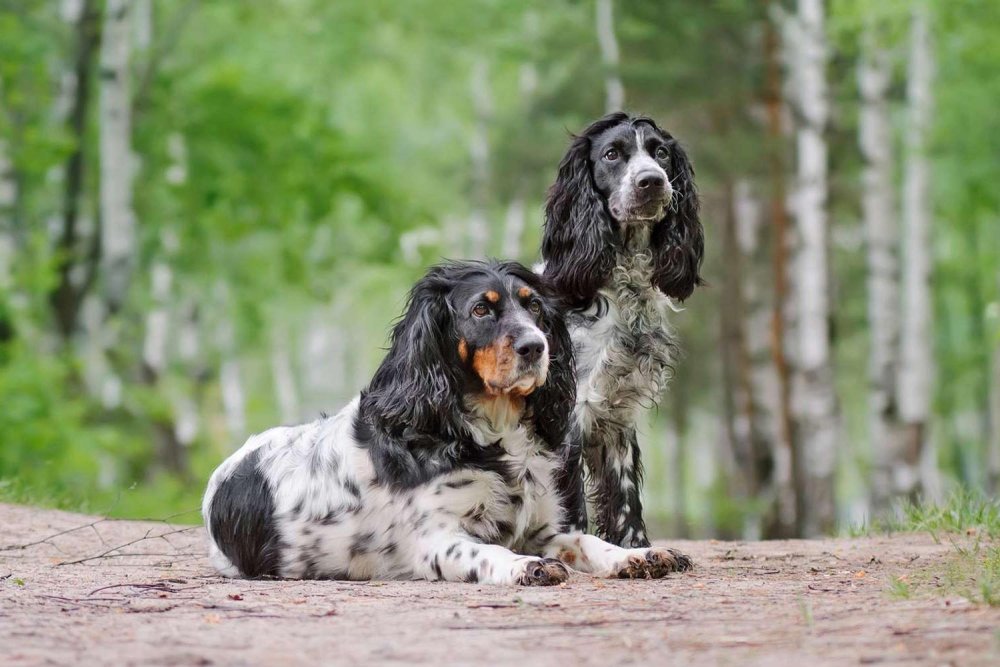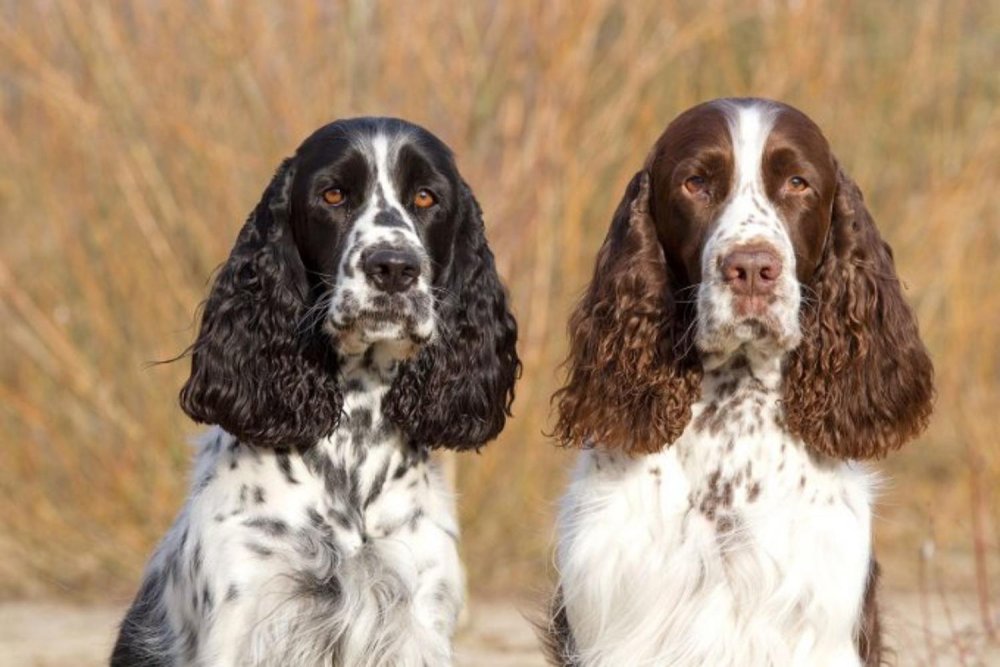- Breed Category: Sporting Group
- Country of Origin: Russia
- Average Height: Males 38-44 cm, Females 36-42 cm
- Average Weight: Males 13-16 kg, Females 11-14 kg
- Average Life Span: 12-14 years
- Grooming Requirements: Moderate, regular brushing needed
- Exercise Requirements: High, needs daily exercise
- Coat Type: Medium, wavy or curly
- Coat Color Variations: Various, often multi-coloured
- Shedding Level: Moderate
- Ear Type: Long, floppy
- Tail Type: Docked or natural, feathered
- Temperament: Friendly, energetic, intelligent
- Intelligence Level: High
- Barking Tendency: Moderate
- Compatibility with Children: Good, very friendly
- Compatibility with Other Pets: Generally good
- Training Ease: Relatively easy, eager to please
- Common Health Issues: Hip dysplasia, ear infections
- Dietary Needs: Balanced diet, high protein
- Energy Level: High
- Drooling Tendency: Low
- Sensitivity to Weather: Moderate, avoid extreme temperatures
- Overall Maintenance Level: Moderate
- Original Purpose: Hunting, retrieving
- Apartment Friendly: Yes, with sufficient exercise
- Best Suited For: Active families, hunters
- Cost of Ownership: Moderate
- Unique Traits: Excellent scenting ability
Think all spaniels are the same? Let’s dive into the world of the Russian Spaniel, a breed that stands out with its unique charm and versatility. This article aims to shed light on the breed’s characteristics, history, and care needs, offering a comprehensive guide for potential owners and enthusiasts alike.
The Russian Spaniel, a relatively young breed, emerged in the mid-20th century. Developed in Russia, it was bred by crossing various spaniel breeds to create a versatile hunting companion. Its history is rooted in practicality, designed to thrive in diverse terrains and climates. Today, the Russian Spaniel is cherished not only for its hunting prowess but also for its friendly and adaptable nature, making it a beloved family pet.
Development and Role in Hunting

Development of the Breed in Russia
The Russian Spaniel was crafted with a clear purpose in mind. In the mid-20th century, breeders in Russia sought to create a dog that could handle the country’s varied landscapes. By blending different spaniel breeds, they achieved a dog that was not only versatile but also resilient. This breed was designed to be a reliable partner in the field, capable of adapting to the challenges of Russian terrain.
Role in Hunting and Retrieving
When it comes to hunting, the Russian Spaniel is in its element. Known for its keen sense of smell and boundless energy, this breed excels in flushing out game and retrieving it with precision. Whether it’s in dense forests or open fields, the Russian Spaniel’s agility and determination make it a favourite among hunters. Its ability to work tirelessly and efficiently is a testament to its breeding.
Physical Characteristics
Physically, the Russian Spaniel is a picture of athleticism. It sports a medium-sized frame, with a sleek, muscular build that hints at its hunting prowess. Its coat is typically wavy or curly, providing protection against the elements. The breed’s expressive eyes and floppy ears give it a friendly appearance, while its strong legs and compact body ensure it can keep up with the demands of an active lifestyle.
Appearance and Unique Traits
The Russian Spaniel is a medium-sized dog, perfectly balanced with a sleek, muscular build. Its coat is a standout feature, often wavy or curly, and comes in a variety of colours, including black, brown, and white, often with distinctive markings that add to its charm. The breed’s long, floppy ears and compact body are not just for show; they are designed for function, aiding in its role as a hunting companion.
Temperament and Behaviour
When it comes to temperament, the Russian Spaniel is as friendly as they come. This breed is known for its adaptable nature, making it a great fit for families and active individuals alike. They are energetic and eager to please, which makes training a breeze. Whether it’s playing in the backyard or joining you on a hike, their enthusiasm is infectious. They thrive on companionship and are happiest when they’re part of the action.
Personality and Suitability

Typical Personality Traits
The Russian Spaniel is a bundle of joy, known for its friendly and energetic nature. This breed is intelligent, making it quick to learn and eager to engage in activities. Their lively spirit is balanced by a gentle disposition, making them approachable and easy to get along with.
Suitability as a Family Pet and Hunting Companion
As a family pet, the Russian Spaniel is a fantastic choice. Their friendly nature means they fit right into family life, while their intelligence and energy make them excellent hunting companions. They adapt well to different environments, whether it’s a bustling household or a quiet countryside.
Interaction with Children and Other Animals
Russian Spaniels are great with kids, often forming strong bonds with younger family members. Their playful yet gentle nature makes them ideal playmates. They generally get along well with other animals, especially if socialised from a young age.
Training and Exercise Needs
Training a Russian Spaniel is usually straightforward due to their eagerness to please. They respond well to positive reinforcement and enjoy learning new tricks. Regular exercise is essential to keep them happy and healthy, so be prepared for daily walks and playtime.
Training, Exercise, and Health

Importance of Early Training and Socialisation
Getting a head start on training and socialisation is crucial for the Russian Spaniel. Early exposure to different environments, people, and other animals helps them grow into well-rounded adults. This breed is naturally friendly, but early socialisation ensures they remain confident and adaptable in various situations.
Recommended Training Techniques
Russian Spaniels are eager learners, making training a rewarding experience. Positive reinforcement works wonders with this breed. Use treats, praise, and play to encourage good behaviour. Consistency is key, so keep training sessions regular and engaging to maintain their interest.
Daily Exercise Requirements and Activities They Enjoy
These dogs are bundles of energy, so daily exercise is a must. Aim for at least an hour of activity each day. They love walks, runs, and games of fetch. Incorporating variety keeps them mentally stimulated and physically fit. Agility courses or scent work can also be great fun for them.
Health and Lifespan
Russian Spaniels are generally healthy dogs with a lifespan of around 12 to 14 years. Regular vet check-ups, a balanced diet, and plenty of exercise contribute to their well-being. Like all breeds, they can be prone to certain health issues, so staying informed and proactive is important.
Health and Care

Common Health Issues
While Russian Spaniels are generally healthy, they can be prone to ear infections due to their floppy ears, which can trap moisture. Regular ear cleaning can help prevent this. Hip dysplasia and eye conditions are also potential concerns, so it’s wise to keep an eye out for any signs of discomfort or vision issues.
Average Lifespan and Health Tips
With a lifespan of 12 to 14 years, Russian Spaniels can be long-lived companions. To keep them healthy, ensure they have a balanced diet and regular exercise. Maintaining a healthy weight is crucial, as obesity can exacerbate joint issues.
Preventative Care Recommendations
Regular vet check-ups are essential to catch any health issues early. Vaccinations, flea and tick prevention, and dental care should be part of their routine. Consider joint supplements if your vet recommends them, especially as they age.
Grooming and Maintenance
Their wavy or curly coat requires regular brushing to prevent matting and tangles. Bathing should be done as needed, but not too frequently to avoid stripping natural oils. Pay special attention to their ears, keeping them clean and dry to prevent infections.
Coat Care and Grooming Routines

Shedding and Seasonal Grooming Tips
The Russian Spaniel’s coat is a standout feature, but it does require some attention. Regular brushing is key to keeping their wavy or curly fur in top condition. During shedding seasons, usually in spring and autumn, you might notice an increase in loose hair. A good brush a few times a week can help manage this and keep your home a bit tidier. It’s also a great way to bond with your dog.
Bathing should be done as needed, but not too often. Over-bathing can strip their coat of natural oils, which are essential for keeping their skin healthy. Pay special attention to their ears, as their floppy nature can trap moisture and lead to infections. Regular ear checks and cleaning are a must.
Diet and Nutrition
A balanced diet is crucial for the Russian Spaniel’s health and vitality. High-quality dog food that meets their nutritional needs is a good start. Look for options rich in protein and healthy fats to support their active lifestyle. Portion control is important to prevent obesity, which can lead to joint issues. Always ensure they have access to fresh water, especially after exercise.
Consider incorporating some variety into their diet with fresh fruits and vegetables, but always check which ones are safe for dogs. Regular vet check-ups can help tailor their diet to any specific health needs they might have as they age.
Nutritional Needs and Feeding Guidelines
Nutritional Needs for Optimal Health
Russian Spaniels thrive on a balanced diet that supports their active lifestyle. High-quality dog food rich in protein and healthy fats is essential. Look for options that include omega-3 and omega-6 fatty acids to keep their coat shiny and skin healthy. Avoid foods with artificial additives and fillers, as these can lead to allergies and digestive issues.
Foods to Include and Avoid
Incorporate lean meats, fish, and whole grains into their diet. Fresh fruits and vegetables like carrots and blueberries can be great treats, but steer clear of grapes, onions, and chocolate, which are toxic to dogs. Always ensure they have access to fresh water, especially after exercise.
Feeding Schedules and Portion Recommendations
Feed your Russian Spaniel twice a day to maintain energy levels and prevent overeating. Portion sizes depend on their age, weight, and activity level, so consult your vet for tailored advice. Monitor their weight regularly to avoid obesity, which can strain their joints.
Fun Facts and Trivia
Did you know that Russian Spaniels were originally bred to handle the diverse Russian terrain? Their versatile nature makes them excellent companions for both hunting and family life. Despite their hunting roots, they are known for their gentle and friendly disposition, making them a hit with kids and other pets.
Interesting Tidbits and Famous Russian Spaniels

Interesting Tidbits about the Breed
Russian Spaniels are a fascinating breed with a rich history. They were developed in the Soviet Union during the mid-20th century, specifically designed to be a versatile hunting companion. Unlike some other spaniel breeds, Russian Spaniels have a unique ability to adapt to various terrains, from dense forests to open fields. This adaptability is a testament to their robust breeding and practical origins.
One interesting fact is that Russian Spaniels are known for their exceptional sense of smell. This makes them not only great hunting dogs but also excellent at scent work and tracking activities. Their keen noses and energetic nature mean they excel in roles that require precision and endurance.
Famous Russian Spaniels in Media or History
While Russian Spaniels may not be as widely recognised in media as some other breeds, they have made their mark in history. During the Soviet era, these dogs were highly valued for their hunting skills and were often featured in hunting magazines and literature. Their reputation as reliable and hardworking companions made them a favourite among hunters and outdoor enthusiasts.
In recent years, Russian Spaniels have gained popularity in dog sports and competitions, showcasing their agility and intelligence. Their friendly and adaptable nature has also made them beloved pets in many households, further cementing their place in the hearts of dog lovers worldwide.
Final Thoughts

The Russian Spaniel is a versatile and charming breed. With its friendly nature and hunting prowess, it offers a unique blend of companionship and utility. This breed’s adaptability and intelligence make it a perfect fit for active families and hunting enthusiasts alike. Embracing a Russian Spaniel means welcoming a loyal, energetic partner into your life. Consider this breed if you’re ready for an engaging and rewarding canine experience.
